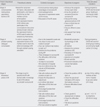Abstract
Purpose
The purpose of this study was to develop an antepartum-postpartum breast-feeding program titled "Breast-feeding Empowerment Program" and to measure the effects of this program on breast-feeding empowerment and the rate of exclusive breast-feeding.
Results
The scores for breast-feeding empowerment of the experimental group (EG) were higher than those of the control group (CG) at week 1, 4, 8, 12. The rates for exclusive breast-feeding of the experimental group were also higher than those of the control group: 86.4% in the EG and 40.9% in the CG at week 1; 100% vs 42.9% at week 4; 86.4% vs 38.1% at week 8; 95.5% vs 38.1% at week 12; 94.7% vs 31.6% at 6 months; 89.5% vs 26.3% at 12 months.
Conclusion
The study provided evidence that raising consciousness and strengthening mother's will and skills for exclusive breast-feeding helps them to achieve successful breast-feeding by themselves. In addition mothers need to be empowered to breast-feed starting before delivery and continuing after delivery. This approach could make long-term exclusive breast-feeding successful.
Figures and Tables
Figure 1
Research design.
Exp=experimental group; Cont=control group; pp=postpartum; GP=gestational period; d=days; wk=week(s); Tx=treatment; X1=breast-feeding empowerment program, antepartum session #1; X2=breast-feeding empowerment program, antepartum session #2; X3=visiting the mothers where they want (at home, hospital, postpartum care center) after delivery, pp session #3; X4=telephone counseling at postpartum 1 week, pp session #4; X5=telephone counseling at postpartum 4 weeks, pp session #5; X6=telephone counseling at postpartum 8 weeks, pp session #6; X7=telephone counseling at postpartum 12 weeks, pp session #7.

References
1. Blyth R, Creedy DK, Dennis CL, Moyle W, Pratt J, De Vries SM. Effect of maternal confidence on breast-feeding duration: An application of breast-feeding self-efficacy theory. Birth. 2002. 29:278–284.
2. Cho MJ, Cheon CM, Shin SM, Seo JK. A survey on the factors of breast-feeding failure related to the role of medical personnels. Korean Journal of Pediatrics. 2001. 44:389–396.
3. Choi EO. Effects of empowerment education program for the type II diabetes on empowerment self-care behavior and the glycemic control. 1999. Seoul: Seoul National University;Unpublished doctoral dissertation.
4. Eo YS. Effects of an empowerment program on the burden of mothers having a child with cerebral palsy. Journal of Korean Academy of Nursing. 2005. 35:154–164.
5. Freire P. Pedagogy of the oppressed. 1970. New York, NY: The Continue Publishing Corporation.
6. Jang YS. Effects of a workbook program on the perceived stress level, maternal role confidence and breast-feeding practice of mothers of premature infants. Journal of Korean Academy Nursing. 2005. 35:419–427.
7. Jeong GH. Effect of the nursing intervention program on promoting the breast-feeding practice in primipara. 1997. Seoul: Ewha Womans University;Unpublished doctoral dissertation.
8. Jung JH, Lee K. A survey on mother's perception of breast-feeding. Korean Journal of Pediatrics. 1999. 42:1050–1055.
9. Kang JS. The effects of breast-feeding empowerment program on breast-feeding mother's empowerment state, problems in breast-feeding, and breast-feeding practice rate. 2006. Jinju: Gyeongsang National University;Unpublished master's thesis.
10. Kim SK, Cho AJ, Kim YK, Park SK, Lee KW. 2003 the survey on the national fertility, family health and welfare in Korea. 2004. Seoul: Korea Institute for Health and Social Affairs.
11. Kim YM, Park YS. A Study on the development of the Korean Breast-feeding Empowerment Scale. Korean Journal of Women Health Nursing. 2004. 10:360–367.
12. Mohrbacher N, Stock J. The breast-feeding Answerbook. 2003. 3rd ed. Schaumburg: La Leche League International, Inc..
13. Park IH. Effects of empowerment education program for the patients having rheumatoid arthritis on empowerment, health status and self-care activities. 2001. Seoul: Chung-Ang University;Unpublished doctoral dissertation.
14. Park OH. The effects of antenatal breast care on breast-feeding practice. Journal of Korean Academy of Nursing. 1992. 22:29–41.
15. Pugh LC, Milligan RA. Nursing intervention to increase the duration of breast-feeding. Applied Nursing Research. 1998. 11:190–194.
16. World Health Organization. The optimal duration of exclusive breast-feeding: A systemic review. 2002. Geneva: World Health Organization.
17. Yoo SM, Choi YH, Lee SH, Joo YH, Han KS, Huh BY. The effects of Dr's recommendation & education on feeding method. Journal of Korean Academy of Family Medicine. 1994. 15:238–249.
18. Yoon JW, Park YJ. Effects of a breast-feeding promotion program for working women. Journal of Korean Academy of Nursing. 2008. 38:843–852.
19. Yun SE. Effect of the breast feeding knowledge, method and feeding rate in primipara about the education of breast-feeding according to the stage of the prenatal and postnatal period. 2003. Gongju: Kong Ju National University;Unpublished master's thesis.




 PDF
PDF ePub
ePub Citation
Citation Print
Print






 XML Download
XML Download